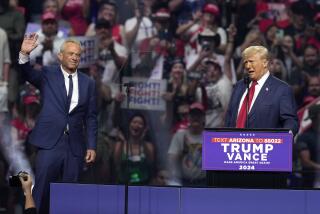Pushing Tobacco Overseas Discredits Drug War Here
- Share via
The traditional rationale given for this country’s campaign against drug abuse is the need to protect the health of America’s youth. Increasingly on this basis we have been willing to accept that tobacco needs to be included in the same category as other drugs of abuse. Indeed, in commending the new drug czar, William J. Bennett, for his decision to give up smoking, the New York Times observed in an editorial that Bennett could not have plausibly led the national drive against drug addiction while himself addicted to nicotine.
A primary element of the anti-drug campaign of all recent Administrations and, especially the Reagan and Bush Administrations, has been to gain the collaboration of the governments of drug-producing countries in preventing the trafficking of drugs to the United States. At the same time, however, our government has been actively promoting the sale of U.S. tobacco products to the rest of the world.
An estimated 10,000 individuals die worldwide each year from the effect of illicit drugs. More than 2.5 million die from the effects of tobacco. More Colombians die from the effects of American tobacco than do Americans from cocaine, and more Thais die from our tobacco than do Americans from Southeast Asian heroin.
As if this were not bad enough, the office of the U.S. trade representative has threatened three countries with trade sanctions for refusing to open up their markets to United States tobacco products, and is threatening other countries that have banned or are strictly regulating their advertisement and promotion. It is a modern version of the Opium Wars of the 1840s, when the British sent a military force to compel the Chinese government, against its will, to continue to allow its population to be supplied by British and American opium merchants. Then as now, powerful economic interests prevailed in their desire to exploit a lucrative market without regard for the health and suffering of the users, or their government’s efforts to protect them.
While Bennett could not plausibly lead the national drive against drug addiction while himself addicted to nicotine, the United States can not plausibly lead the global effort to control drug trafficking while it remains the world’s primary purveyor of drug-related death and disease through the export of its tobacco products. Nor will the argument that heroin and cocaine use must be curbed at all cost because of the health threat they pose to our youth have much credibility in the rest of the world.
The inevitable conclusion is that our drug policies are fundamentally determined, not primarily by health concerns, but by economic interests. As a rich and powerful nation, we are determined to define as legal a drug we can export at immense profit to the rest of the world, regardless of the health consequences--while denying largely impoverished countries access to the lucrative U.S. market because they cultivate drugs we have defined as illegal.
The Bush Administration has a unique opportunity to establish clearly that health considerations are the basis for our anti-drug policy. No clearer signal could be sent than to state unequivocally that the U.S. government will do nothing to help promote the sale of tobacco products overseas, much less inflict sanctions against nations that seek to curtail their use. Such a statement would go far to re-establish the sagging credibility of the President’s anti-drug effort and provide strong leadership for the war on drugs worldwide.
More to Read
Sign up for Essential California
The most important California stories and recommendations in your inbox every morning.
You may occasionally receive promotional content from the Los Angeles Times.










